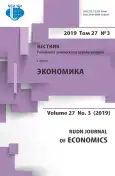Торговая война между США и Китаем: реакция фондовых бирж на трансформацию внешнеполитической повестки
- Авторы: Кучма Н.С.1
-
Учреждения:
- Национальный исследовательский университет «Высшая школа экономики»
- Выпуск: Том 27, № 3 (2019)
- Страницы: 415-428
- Раздел: Экономика развитых и развивающихся стран
- URL: https://journal-vniispk.ru/2313-2329/article/view/342857
- DOI: https://doi.org/10.22363/2313-2329-2019-27-3-415-428
- ID: 342857
Цитировать
Полный текст
Аннотация
В течение полутора лет внимание инвесторов во всем мире было сосредоточено на противостоянии двух крупнейших экономиках мира. Обострение торговых отношений между США и Китаем стало одной из главных причин серьезных изменений на мировых рынках. Изменения и сдвиги, спровоцированные данным конфликтом, требуют самого пристального внимания, поскольку их последствия очевидно приведут к фундаментальным преобразованиям ландшафта международных отношений и практики экономического взаимодействия не только в отношении сторон конфликта, но и всего мира. Цель данной статьи - проанализировать реакции фондовых бирж США и Китая в связи с разворачивающимся торговым конфликтом между двумя странами, а также оценить степень гибкости и адаптации двух экономик к внешним вызовам. Исследование основано на сравнительном методе. Представлены основные элементы, из которых состоит научный анализ политической реальности, лежащей в основе конфликта, а также динамика фондовых бирж в ходе развития конфронтации.
Ключевые слова
Об авторах
Надежда Сергеевна Кучма
Национальный исследовательский университет «Высшая школа экономики»
Автор, ответственный за переписку.
Email: n.s.kuchma@gmail.com
магистр востоковедения, Школа востоковедения
Российская Федерация, 109028, Москва, Покровский бульвар, 11Список литературы
- BBC News. (2016, 2 May). Trump accuses China of 'raping' US with unfair trade policy. https://www.bbc.com/news/election-us-2016-36185012 (accessed: 12.02.2019).
- BBC News. (2016, 7 January). Donald Trump favours high tariffs on Chinese export. https:// www.bbc.com/news/business-35258620(Accessed: 12/02/2019)
- BBC News. (2018, 15 July). Trump puts 25% tariff on Chinese goods. https://www.bbc. com/news/business-44498484 (accessed: 09.04.2019).
- BBC News. (2019, 10 May). Sino - US trade war: China announced that it will withstand the ups and downs of the Sino - Hong Kong stock market after the introduction of US tariffs. https://www.bbc.com/zhongwen/simp/chinese-news-48213174 (accessed: 10.05.2019).
- CNBS. (2018, 18 May). US - China trade pact is taking shape, with tariff reductions on the table, official says. https://www.cnbc.com/2018/05/18/us-china-trade-deal-on-tariffstakes-shape-under-trump-administration.html (accessed: 12.04.2019).
- CNBS. (2018, 7 September). Nasdaq falls for fourth straight day, posts worst start to September since 2008. https://www.cnbc.com/2018/09/07/us-markets-jobs-report-and-data-infocus.html (accessed: 12.03.2019).
- Counted on data of World Steel in Figures 2003-2017. https://www.worldsteel.org/en/dam/ jcr:f9359dff-9546-4d6b-bed0-996201185b12/World+Steel+in+Figures.pdf (accessed: 12.02.2019).
- Glenn J. (2016). China's Challenge to US Supremacy: Economic Superpower versus Rising Star. Palgrave.
- Huan Xiang. (1981). On Sino - U.S. Relations. Foreign Affairs. https://www.foreignaffairs.com/ articles/china/1981-09-01/sino-us-relations (accessed: 28.03.2019).
- Kavalski E. (2009). China and the global politics of regionalization. 1st ed. Routledge.
- Navarro P. (2006). The coming China wars: Where they will be fought and how they will be won. FT Press.
- Navarro P., Autry G. (2011). Death by China: Confronting the Dragon - A Global Call to Action. Pearson FT Press.
- Nishizawa K., Wang C. Trump's Trade Tweets Hammer China's Stocks and Currency. The Bloomberg. https://www.bloomberg.com/news/articles/2019-05-05/chinese-stocksmay-come-under-pressure-at-reopen-after-holiday (accessed: 10.05.2019).
- Pillsbury M. (2015). The Hundred Year Marathon: China’s Secret Strategy to Replace Ame- rica as the Global Superpower. New York: St. Martin Griffin.
- Politico. (2016). Donald Trump 2016 RNC draft speech transcript. https://www.politico.com/ story/2016/07/full-transcript-donald-trump-nomination-acceptance-speech-at-rnc-225974 (accessed: 12.02.2019).
- Scott R.B. Record U.S. trade deficit in 2018 reflects failure of Trump’s trade policies. Economic Policy Institute. https://www.epi.org/blog/record-u-s-trade-deficit-in-2018-reflectsfailure-of-trumps-trade-policies/ (accessed: 10.05.2019).
- South China Morning Post. (2018, 28 December). Shanghai’s stock index ends 2018 as the world’s biggest loser as trade war, slowing Chinese economy weigh on confidence. https:// www.scmp.com/business/markets/article/2179765/hong-kong-shares-steady-earlytrading-after-wall-streets-wild (accessed: 09.04.2019).
- Stempel J. CEO of Buffett-owned Brooks Running moves production out of China, cites tariff threat. The Reuters. https://www.reuters.com/article/us-berkshire-buffett-brooks/ceoof-buffett-owned-brooks-running-moves-production-out-of-china-cites-tariff-threatidUSKCN1S91DU (accessed: 10.05.2019).
- Stock Market Group. (2019, 10 May). US stock market disappointed with US - China relationship. http://stock-maks.com/fs/40255-fondovyy-rynok-ssha-razocharovan-otnosheniyami- ssha-i-kitaya.html (accessed: 10.05.2019).
- Swanson A. (2018, 1 March). Trump to Impose Sweeping Steel and Aluminum Tariffs. The New York Times. https://www.nytimes.com/2018/03/01/business/trump-tariffs.html (accessed: 12.02.2019).
- The Reuters. (2019, 6 May). Warren Buffett says US - China trade war would be 'bad for the whole world'. https://economictimes.indiatimes.com/markets/stocks/news/warren-buffett- says-us-china-trade-war-would-be-bad-for-the-wholeworld/articleshow/69205762.cms (accessed 10.05.2019).
- Varfalovskaya R.A. (2018). Razvitiye vneshney torgovli Kitaya v usloviyakh globalizatsii i “torgovykh voyn” SSHA [The development of China’s foreign trade in the context of glo- balization and “trade wars” of the USA]. The Far Eastern Affairs, 6, 85-91. (In Russ.)
- Vinogradov A.O., Salitsky A.I., Semenova, N.K. (2019). Ekonomicheskoye protivostoyaniye SSHA i Kitaya: ideologiya, khronologiya, smysl [US - China Economic Confrontation: Ideology, Chronology, Meaning]. Vestnik RUDN. International Relations, 19(1), 35-46. http://dx.doi.org/10.22363/2313-0660-2019-19-1-35-46. (In Russ.)
- Wang O. China’s industrial profits drop for first time in three years due to trade war impact. China Morning Post. https://www.scmp.com/economy/china-economy/article/2179652/ chinas-industrial-profits-drop-first-time-three-years-due (accessed: 09.04.2019).
Дополнительные файлы









